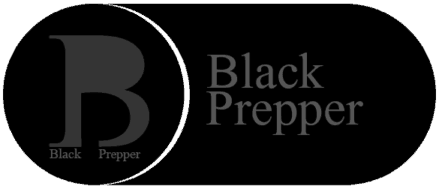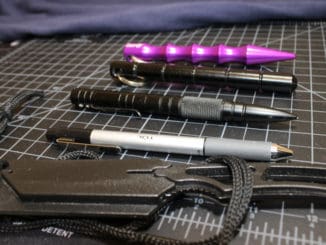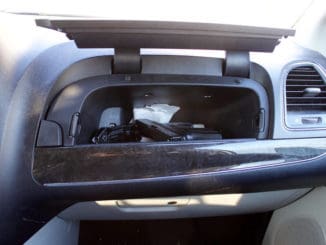In any scenario, priority one is the safety of you and your family. This fact becomes more important when we are in survival mode. How exactly do you protect yourself and your family? The best form of protection is to not be in harms way or be perceived as a target in the first place. There are currently a number of TV shows dealing with prepping where individuals detail their plans and resources. The number one issue with these shows is that they paint a target on the families profiled. In some aspects, prepping is like Fight Club; you don’t talk about it. Providing an educational service to people who are interested in prepping is great, but at the same time, you should not disclose what your plans are and where you keep your supplies. No matter how strong you think your defenses are, the fact is, you are putting yourself in the position of having to defend yourself.
Here is a scenario that could happen to one of these families profiled. I recognized them as one of my neighbors. I now know they are preppers and have supplies in the home. I also know they have a bug-out location based on what they disclosed during the show. Assuming I am not a prepper, I know I can target this family to get their supplies. Even being a prepper, I can still target them to aid in my survival. I can also force them to take me to their bug-out location and either get those supplies or take over that location. They may be able to defend themselves against me, but for how long? And I may not be the only one targeting them. That being said, do not make yourself a target by going on TV and giving a tour of your supplies.
Although not making yourself a target is the best line of defense, you cannot make that your only form of defense. Firearms, edged weapons and blunt weapons are a necessity to aid in your self-defense. Along with these types weapons, training and practice are equally important. Wielding a weapon without knowledge and practice could render that weapon ineffective. For example, many people buy firearms but don’t get the proper training required to effectively use those weapons. There is more to shooting than pointing and pulling the trigger (this includes shotguns with shot shells). Trigger control, recoil management, sight alignment, target acquisition, breathing, and more are things to keep in mind in becoming a good shooter. Without training and practice, you will have a difficult time hitting your target, especially under stress. When I first started shooting the .40 S&W round, the recoil made the follow-up shots slower and off target. I had to spend more time trying to reacquire the target which slows down the follow-up shots or I would be wildly off target. It wasn’t until after hours of practice and a few hundred rounds that I felt comfortable using that round for self-defense. The same goes for melee weapons. The added danger with the misuse of melee weapons is the close proximity to the assailant. The possibility of being overpowered and having your weapon taken and used against you is much greater. This is why training and practice are important. Knowing when to swing a bat, for example, verses using it to jab could make the difference in a life and death situation.
If you don’t own any firearms or have access to at least one, you should obtain one as soon as possible. If your state requires you to have a permit to own or purchase firearms, start the process immediately. Some places make it difficult or expensive to get a permit. For example, New York City requires a permit to own firearms and the associated fees are hundreds of dollars. Also, firearms must be registered. Conversely, a number of states don’t require a permit to own or purchase a firearm at all, just a valid state ID. My state requires separate permits to purchase handguns and long guns. The process, according to the law, should take no more than 30 days. In reality, most people have to wait months before receiving their permit. I had to wait almost four months before receiving the permits. Additionally, a growing number of states are adopting a one handgun a month policy in hopes to lower illegal gun sales. I will have an in depth article on gun control in the future. If you haven’t already done so, you should start building your firearm collection before it becomes more difficult.
If you have a criminal history, it may be illegal for you to own a firearm. While I do not endorse allowing everyone with a questionable background to own a firearm, the way you choose to protect yourself and family in a survival situation is ultimately up to you. Some may choose to illegally obtain firearms so they are not at a disadvantage, but being caught with it may be more problematic than it is worth. If your criminal past is truly in your past, be prepared the best way you can. For those with a criminal past, the only time I would suggest using a firearm would be in a true SHTF scenario. There will be less accountability and less of a chance of you being penalized for having it. On the other hand, if someone illegally enters your home outside of a SHTF scenario, you may have to deal with it in a different manner than someone who can legally own firearms. Use your better judgement and balance what you can do to protect your family while avoiding being changed with a crime.
What kinds of weapons should you have? First, you should have a knife. I prefer a folding knife, as it can be placed in the pocket and goes undetected. A spring assisted folding knife has an advantage as it can be deployed more quickly. Something like the Smith & Wesson M&P Magic Assist knives are great, but may be illegal in some states. Check your local laws to find out what you can and can’t legally own. Another weapon you should have is a blunt object. A wooden baseball bat can fit this area. It is something you can keep in plain sight and not have to worry about it being the focus of attention. Extendable batons are another option, but some of the low cost variety are of substandard quality and are easily bent. I suggest going with a reputable brand, such as Smith & Wesson and ASP. You may pay more, but they are made to last. (NOTE: I am not affiliated with Smith & Wesson or ASP in any way, I am just familiar with their products.)
This leaves us with firearms. Just about everyone who sets out to buy their first firearm always asks, “What gun should I buy?” This is a very difficult question to answer. For the purpose of this article, my answer would be a 12 gauge pump action shotgun loaded with birdshot. For home protection, the shotgun is king. With multiple projectiles, you stand a greater chance of hitting your target even when under stress. I suggest birdshot because there are more projectiles in those shells which increase your chances of hitting your target. Additionally, there is less wall penetration with birdshot than buckshot and slugs. In apartment living this is more of a concern since your neighbors are in close proximity. You can also load all types of shells if needed. I suggest a pump action because of the psychological aspect it brings. The sound is distinctive and can deter an intruder from proceeding any further.
Some people may be content with one firearm and stop here, but only having one firearm does not offer the best protection. You should have a firearm in every room or at least one between you and every potential entry point. For example, if you live in a high rise apartment building, windows may not be an entry point. On the other hand, if you have a terrace or fire escape, that should be considered a potential entry point. If you only have one firearm, it should be kept in the room where you spend the most time or your bedroom. I strongly discourage having only one firearm, but if that is all you have, you should have a plan to get to it quickly and safely. Having to go past an entry point to retrieve your weapon can be very dangerous and should be avoided. Ideally, you want to have a weapon, preferably a firearm, in every room. These weapons should remain out of sight but easily accessible. Bookcases are a great hiding place for weapons. Tall bookcases allow you to keep a weapon out of sight and reach until needed. If you have children, you have to take them into consideration when creating your plan. You do not want your children finding your weapons and injuring themselves.
You may want to keep a gun in the kitchen and bathroom as well. While you may have a number of knives in the kitchen, in a gunfight, you need a gun. There are a number of places you can keep a firearm in the kitchen. You can place a handgun on the ceiling of a drawer, that keeps it out of sight, but easily accessible. It may take some fine tuning, but it is a viable option. You may also want to store a firearm in the lower cabinets. Again, keep your children in mind when you design your plan. You may already have cabinet locks in the kitchen to keep young kids out, but older children may find your weapons. You should consider educating your children on proper firearm use so they don’t play with them if they are found. In some states, it is illegal to have firearms accessible by minors under 16 years old. Now for the bathroom. You are most vulnerable in the bathroom as this is a room where you are usually in a compromising position. If you have a toilet with a tank, you may want to store your firearm under the tank cover. This gun should be sealed in a watertight plastic bag. You should not just hide all of these firearms and just forget about them. They should regularly be taken out and tested to ensure they will be functional when you need them.
You know your home best. If an intruder enters, you should be equipped to handle the situation. If you are to retreat, you should know exactly where you are going and how to get there. If you are unable to retreat, having your weapons at the ready or in close proximity may be the only thing that will allow you to survive the encounter. Create a plan, and go through a dry run. Either imagine someone entered your home or have a friend enter your home and try to defend against them. Of course, do not use live weapons. Accidents happen and this is not a situation you want to go awry. Refine your plan and always keep in mind that no amount of practice will have you 100% ready to face an intruder. With enough practice, you should feel confident that you can defend yourself.



I’m new to prepping. I seem to be the only black prepper. I’m looking for other black preppers.
I feel the same way non of my people dont seem to understand the need to be prepared. Feel to email me I am in The Woodlands area,
Hi Theresa,
Yeah,
For some reason there doesn’t seem to be too many of us. At work when I try to subtly hint that “things” can go south pretty quick, and when that does happen it will be too late to get whatever it is you need, folks give me a kinda weird look.
People seem to believe in the system, and that the grid will stay up no matter what happens.
Finding preppers is hard. Finding like minded black folks seems harder. Makes me wonder how many of us will survive WHEN the SHTF.
Hi! Saw your response on BP recently and thought I would respond. As a black family, we are the only black peepers we know and are interested in creating a community of black preppers. My family and I are in DC and would love to connect with other black preppers wherever they are located. If you are interested, please email me at: [email protected]. If you can use the subject “black preppers” that would be great. We just want to share info and learn new skills with like minded black people. Anyone else interested in connecting, please also feel free to email. Thanks!